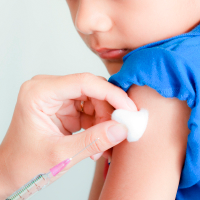Some Pediatric Patients with HIV May Resist Measles Vaccine
Despite being vaccinated, many children with the human immunodeficiency virus (HIV) may not have immunity against potentially deadly illnesses.

Despite being vaccinated, many children with the human immunodeficiency virus (HIV) may not have immunity against potentially deadly illnesses.
The National Institutes of Health (NIH) and Centers for Disease Control and Prevention (CDC) collaborated to study how children who had been exposed to HIV in the womb differ when it comes to disease immunity. Not only did the researchers find that the patients may not be able to ward away measles, mumps, and rubella, but the timing of antiretroviral therapy plays an important role in the MMR vaccine outcomes.
“Having a high level of immunity to measles, mumps, and rubella is important not only for an individual’s health, but also for preventing disease outbreaks in the larger community,” first author George K. Siberry, MD, of the NIH’s National Institute Child Health and Human Development, said in a news release.
From 2007 to 2009, the Pediatric HIV/AIDS Cohort Study (PHACS) enrolled 649 children ages 7 to 15. Of those, 428 children were in the perinatally HIV-infected (PHIV) group — defined as those who became infected around the time of birth. The other 221 children were in the HIV-exposed, uninfected (HEU) group – defined as those who mothers had the virus, therefore exposing them to it, but remained uninfected. About 93% of the participants received at least two doses of the MMR vaccine, which is recommended to protect against the measles, mumps, and rubella.
Children in the PHIV group were much less likely to have protective antibodies against the viruses when compared to the HEU group, according to the findings published in Clinical Infectious Diseases.
“PHIV children who started combined antiretroviral therapy before receiving their MMR vaccine doses were more likely to have protective levels of antibodies against all three diseases, especially if they had higher levels of CD4+ cells at the time they were vaccinated,” the statement explained.
On average, the patients with PHIV, but not HEU, had lower immunity to MMR. Better outcomes were associated with those patients who began antiretroviral therapy first and then received the vaccine.
“Individuals infected with HIV at birth who did not have the benefit of combined antiretroviral therapy before they were vaccinated should speak with their physician about whether they need a repeated course of the vaccine,” Siberry advised.